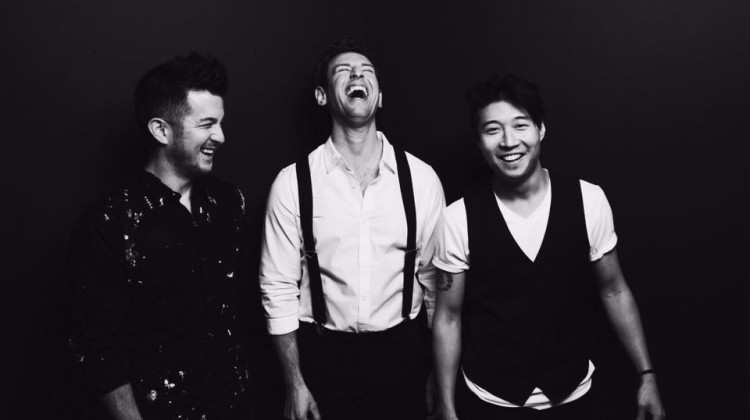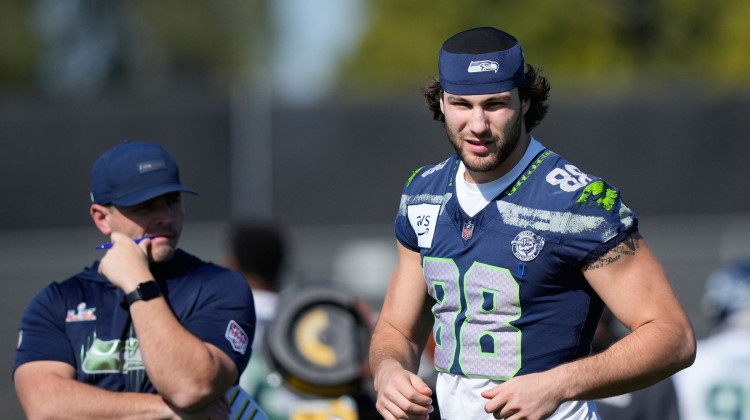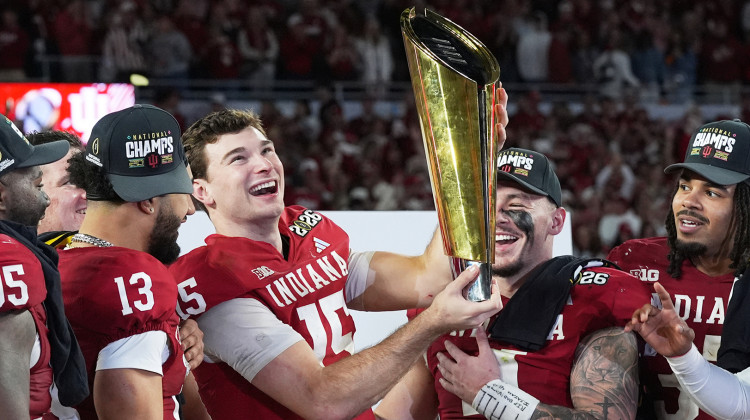For a little over a decade, Time For Three helped redefine the concert experience with the Indianapolis Symphony Orchestra. As the Artists In Residence with the ISO, they created the Happy Hour concert series, melding classical music with hip hop, rock and pop and any other genre you can think of, bringing a party atmosphere to the Hilbert Circle Theatre, while firmly maintaining their classically trained roots. Now, Time For Three is returning to Indianapolis for the first time as Grammy winners, performing this weekend with the ISO. Time For Three is Nick Kendall and Charles Yang on violin and Ranaan Meyer on double bass. They spoke with WFYI’s Ray Steele.
NICK KENDALL: We’ve missed you, Ray!
RAY STEELE: I have missed you, too. As I said, you’re now Grammy winners – Best Classical Instrumental Solo for your album “Letters For the Future”, recorded with the Philadelphia Orchestra. Now, the cliche is, everybody says it's an honor to just be nominated. But Nick, what's it really like to win a Grammy?
KENDALL: I mean, it's sorry, but it's true, it was a huge honor to just be nominated. But because you have to understand that this is your peers in the industry who are acknowledging and pointing a light at the work that you're doing. And, you know, it's like when it's, it's that moment that you feel recognized and seen, especially - like you guys in the Indianapolis community know this probably better than any community around the world - it's kind of hard to define what we are and what kind of band we are, unless you go see us live. And we're so much on the fringe of the art form. So it was amazing, just to be recognized in that way. And then of course, winning, I mean, was just a blur of emotion for all three of us, and very exciting. You know, I think we've been in this business enough to know that we have to be realistic about what to expect from it. So it was just so good to just be able to be recognized and when that but it really has changed your life. It has changed our career. We are looking at a future that's very busy. But also really creative. And it's keeping us on our toes. You know, we're working really hard, but having a lot of fun doing it like we always had. And we you know we another thing, though, that's really meaningful about coming back to our home Indianapolis is big, as this is something that we always said while we were there during our residency that you mentioned, Ray, because we were we were definitely there for a purpose. But we were also growing as a group and learning a lot. And when we were recognized and won this, this, this award, the Grammys, we looked back at all of the significant relationships and partnerships and opportunities for us to grow. And we feel like this is a marquee for all of those experiences. And to get us to the point where we could record this album and represent this body of work, which is really exciting. And yeah, so just to say that our residency and the work that we did on stage with the musicians of the Indianapolis Symphony and the community we feel like is kind of all wrapped up in the underbelly of this of this.
STEELE: I have to work this in. I suppose there's the emotion in the auditorium when you're announced as the winner, and then there's the moment when the actual Grammy shows up in the mail. Ranaan, you documented this on your social media -- the unboxing of the Grammy if you will. The funniest thing for me, I think was one of your kids was super impressed with the Grammy and the other was like well….it's kind of nice.
RANAAN MEYER: Yeah. I even took the Grammy into their schools, their respective schools, my youngest is still in preschool, the other is in elementary school, and I wanted to save the Grammy for the end of the presentation. The guys weren't available. So, it was just me going into the school with the bass. You know, I had all these metaphors about working hard and finding your passion. They're just like, Yeah, show us the Grammy, we don't care. But I think there was some messaging that you know, that was shared that was important. And it is a celebration of, of your family, because they're just as a part of it as we are what we do, we wouldn't be able to do what it is, we can do without their support their love. And, you know, I think that that's to add to what Nick said, that's kind of the beauty of this is we get to celebrate it with a community like Indianapolis. And friends like Indianapolis, that culture that, you know, like our phones were just blowing up for weeks after, after the win. And that meant just as much as going up to the podium and accepting. Another thing that makes this concert, extra poignant and special for time for three is, is we lost an incredible ambassador to the arts, Marianne Tobias, who did so much for the community. And also wrote the program notes for 35 years and might be getting that a little wrong. Maybe it's 36, 34. But, she actually called us when we were on tour in Florida, and was so excited because she had just completed writing the program notes to our shows that are coming up here, and sent it to us so we can read it in advance, not for any editing purposes, just because she was proud of it and excited. And that was actually the last time that we had contact with her. And so, it's really special that those program notes that you'll read when you come to the show are by her this is I think the last year of course that you'll experience her program notes. We feel like she's looking down at us and making the music shine even brighter.
STEELE: Now Charles as the member of Time For Three who joined later on in the band's existence, maybe not being in Indianapolis as much as Ranaan and Nick were, what does this all mean to you -- the Grammy and coming to Indianapolis, a place that obviously means a lot to both Nick and Ranaan?
CHARLES YANG: Yeah, I mean, Indy, for sure, for me is special, because I joined Time for Three in 2016, and in Indy I kind of got grandfathered into this residency. But it was one of the first shows that I played with Time For Three. And then throughout those couple years, in my early years with Time For Three, that was the place the one place that we would go all the time. And we got to work with a top tier orchestra on experimenting with new ideas. And like the guys were saying, you know, what a community to do it with and what a great organization to do it with. You have it wonderful orchestra that is allowing us to just explore, which ultimately led up to us finding our sound, us finding what you know, what this Grammy really is, you know, is finding exactly this kind of repertoire that we want to put out there into the world. So Indy is super special for Time For Three, but for my journey with Time For Three as well. So, it's been quite a journey to go there. Every month, every two months, we'd go there and we felt like we moved in. You know, it felt like I moved in. That was my second home at that time. So yeah, it was fun. It was really fun. We're excited to come back.
STEELE: With the ISO, you’re performing “Contact.” This was a concerto written for you by Kevin Puts, also a Grammy winner; it won for Best Contemporary Classical Composition. Nick, how does this feel not only back in a city that's very special to you, but to perform something that has helped put you firmly on the classical music map worldwide?
KENDALL: First of all, Ray, totally again, I'm just I've missed you, man. Your questions are always so great. I mean, you always ask good questions and because You know us so well. And you probably are leading to the fact that it's such a personal journey when you have such a prolific composer like Kevin Puts. His his fame includes winning a Pulitzer and, you know, these are all fancy words and recognitions that are that are justified, but it's really his work and his harmonies and the way he writes for orchestra, his orchestration. I mean, that's what really drew us to his creative doorstep, and we knocked and he opened it and opened with open arms, accepted our invitation to write for us and most importantly with us, and that was that was why having this piece recognized was so awesome for us because it was such an exciting exchange of ideas. We literally built this together. Like Legos, obviously, he did the lion's share of the genius work. That's just beyond us. I mean, how he hears the orchestra is such a, you know, he's such a storyteller, and emotional writer. But um, you know, incorporating what we do in our what we have is a unique ability as a three as a, as a trio. He just crafted something special and original. And that was, that was something it was, it's very, very different than what's norm in the past in classical music, where a composer will write for a soloist or performer and then just kind of handle the music at the tail end of the process. This was a very dynamic exchange of ideas as we went through the process, and it's a model that has inspired us, but I feel like, we feel like was it a complete continuation of our work that we do in other spaces when we're working with singer songwriters, or working with a hip hop artist, or working with, you know, like, we also scored a movie during the pandemic, which was amazing. It was a continuation of that process of that creative process. But in a space that traditionally hasn't seen that kind of collaboration. Now, it's more prevalent. But this is an example of how that can really happen in a beautiful way. So great question. love answering that.
STEELE: Charles, what's next for Time For Three? How many more Grammys are you going to win? No pressure.
YANG: To your to your earlier question. I still haven't seen my Grammy, I sent it to my parents, and I still have yet to touch it or see it. But it's there. So, it's real. Okay. Not real until you see it yet. But, you know, honestly, it's, it is a big honor to have the Grammy, of course. But I mean, as long as I've been in the band, for musicians like Time For Three, that's not the goal, right? We're just honored to have it. We're really honored to be recognized by our peers for the work that we do. So, it's just that it's not even a hiccup, you can't call it a hiccup because it's a really good hiccup to win this kind of Grammy, but we have to move on, you know? We have to move on to explore being the musicians that we want to be. And so the future's bright, like Nick was saying, we're busy. We're really busy on the road playing. But the creative aspect, you know, that doesn't change. You know, we're constantly trying to redefine our music to experiment to explore, working with new composers, writing ourselves. And, yeah, we're really excited to see what's next. And we're excited for people to see that. Indy has been the perfect vessel for that. The audience base we have in Indianapolis is insane. I mean, they've known Time For Three since before I joined. They've known Time For Three in the old days, which was a completely different sound to what it is now. And they've been with us every step of the way. And we'd love to bring them along for the next turn.
STEELE: That is Charles Yang, along with Ranaan Meyer and Nick Kendall, the Grammy winning Time For Three. Gentlemen, I really appreciate your time and don't be strangers for crying out loud.
KENDALL: Ray, we love you and congratulations on everything. It's so good to see you again.
Time for three is performing this weekend with the Indianapolis Symphony Orchestra. Information is available at IndianapolisSymphony.org.
 DONATE
DONATE








 Support WFYI. We can't do it without you.
Support WFYI. We can't do it without you.